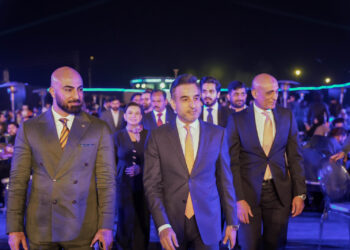Islamabad – Deputy Prime Minister and Foreign Minister Senator Muhammad Ishaq Dar has announced a bold and ambitious goal for Pakistan’s economic future: joining the Group of Twenty (G-20), the world’s most influential economic bloc. Speaking at a special ceremony at the shrine of Shah Abdul Latif Kazmi, also known as Bari Imam, in Islamabad, Dar highlighted the government’s achievements, outlined ongoing reforms, and emphasized Pakistan’s untapped potential in natural resources and global trade.
Pakistan’s Economic Journey – From 24th Largest Economy to Recovery Efforts
Ishaq Dar reminded attendees that in 2017, Pakistan had achieved a significant milestone by becoming the 24th largest economy in the world, a position that reflected years of consistent growth and fiscal discipline. However, he acknowledged that subsequent years brought economic turbulence, marked by inflation, currency devaluation, and structural imbalances.
“Our economy faced a downturn after 2017, and inflation created significant hardships for the people,” Dar said.
“But now, with our policies aligned, we are moving in the right direction.”
The Deputy Prime Minister credited the Pakistan Democratic Movement (PDM) coalition government for steering the country away from economic bankruptcy. He noted that Pakistan, during the previous administration under the Pakistan Tehreek-e-Insaf (PTI), suffered not only financial strain but also diplomatic isolation on the global stage.
Vision 2030: Pakistan’s Path to G-20 Membership
The G-20, comprising the world’s largest economies, represents about 85% of global GDP and 75% of international trade. Inclusion in this elite group would be a historic achievement for Pakistan, elevating its influence in shaping global economic policies.
Dar outlined a strategic vision focused on:
- Industrial growth and export expansion
- Modernizing agriculture with technology integration
- Leveraging Pakistan’s mineral wealth
- Strengthening trade partnerships with emerging and developed economies
- Improving governance and transparency in financial systems
He stressed that joining the G-20 is not just about prestige—it would open doors for increased foreign investment, greater diplomatic leverage, and stronger participation in international trade agreements.
Pakistan’s Untapped Mineral and Energy Resources
Highlighting Pakistan’s immense natural wealth, Ishaq Dar stated:
- Gas Reserves – Pakistan has the fourth-largest natural gas reserves in the world, a potential game-changer for the energy sector if exploration and infrastructure are improved.
- Gold and Copper – Vast deposits in regions like Reko Diq and Saindak hold untapped billions in value.
- Precious Stones – From emeralds to rubies, Pakistan’s gemstone industry remains underdeveloped but ripe for growth.
Dar emphasized that vigorous exploration and responsible resource management could generate trillions of rupees, create jobs, and improve the balance of trade.
From Crisis Management to Sustainable Growth
The Deputy Prime Minister shared that during the recent financial crisis, the government prioritized:
- Stabilizing the currency
- Securing international loans and grants
- Reducing the fiscal deficit
- Negotiating favorable terms with the IMF and friendly countries
He asserted that the PDM government’s economic diplomacy not only prevented default but also re-established Pakistan as a credible partner in the global economy.
Diplomatic Achievements and Regional Stability
On the foreign policy front, Dar mentioned a “great success” in countering India’s ambitions for regional dominance. While he did not disclose sensitive details, he suggested that Pakistan’s diplomatic and strategic actions had thwarted attempts to impose a four-pronged geopolitical strategy in South Asia.
Tribute to the Role of Sufis in Pakistan’s Culture
During his visit to the Bari Imam shrine, Ishaq Dar also highlighted the spiritual and cultural heritage of Pakistan. He paid tribute to the contributions of Sufi saints in spreading Islam, promoting peace, and uniting communities.
“The role of Sufis in building the moral and spiritual foundation of our society is unmatched,” Dar noted.
He also laid a wreath at the shrine and attended ceremonies marking the annual Urs of Hazrat Shah Abdul Latif Kazmi Bari Imam, which will be celebrated from August 8 to 10.
Restoration and Development of Bari Imam Complex
Dar expressed pride that the government had completed long-delayed renovation work on the Bari Imam Complex. This restoration, which includes structural preservation and modernization of visitor facilities, was aimed at honoring the shrine’s historical significance while accommodating thousands of devotees who attend the Urs every year.
He praised the efforts of officials who played a role in the development and preservation of the site, stressing that cultural heritage is a vital component of national identity and tourism development.
Annual Urs of Hazrat Bari Imam – A Cultural Highlight
The three-day Urs attracts thousands of pilgrims from across Pakistan and abroad. The event features:
- Spiritual gatherings and Quran recitations
- Sufi poetry and devotional music (Qawwali)
- Charitable food distribution to visitors
- Special prayers for national unity, peace, and prosperity
Dar noted that such events not only strengthen faith but also bring together people from diverse backgrounds, contributing to social cohesion.
Challenges Ahead and the Roadmap Forward
While expressing optimism, Ishaq Dar admitted that economic recovery and achieving G-20 membership will require sustained efforts. Challenges such as:
- Political instability
- Global economic uncertainty
- Energy shortages
- Trade imbalances
…must be addressed through long-term planning and consistent policy implementation.
He called for national unity, urging all political forces to put the country’s interests above partisan agendas.
Conclusion – A Call for Collective Effort
Dar’s speech was both a celebration of progress and a call to action. The goal of making Pakistan a G-20 economy is ambitious but achievable if the nation harnesses its natural resources, strengthens governance, and builds strong diplomatic and economic partnerships.
“Pakistan will become a prestigious nation among the nations of the world,” he said confidently.
“With unity, hard work, and strategic vision, we will secure our rightful place on the global economic map.”

























